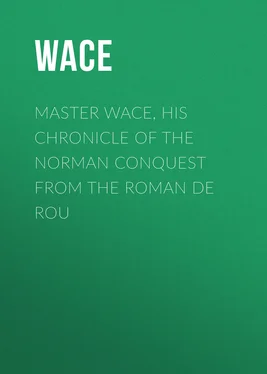Wace - Master Wace, His Chronicle of the Norman Conquest From the Roman De Rou
Здесь есть возможность читать онлайн «Wace - Master Wace, His Chronicle of the Norman Conquest From the Roman De Rou» — ознакомительный отрывок электронной книги совершенно бесплатно, а после прочтения отрывка купить полную версию. В некоторых случаях можно слушать аудио, скачать через торрент в формате fb2 и присутствует краткое содержание. Жанр: foreign_prose, История, foreign_edu, foreign_antique, на английском языке. Описание произведения, (предисловие) а так же отзывы посетителей доступны на портале библиотеки ЛибКат.
- Название:Master Wace, His Chronicle of the Norman Conquest From the Roman De Rou
- Автор:
- Жанр:
- Год:неизвестен
- ISBN:нет данных
- Рейтинг книги:4 / 5. Голосов: 1
-
Избранное:Добавить в избранное
- Отзывы:
-
Ваша оценка:
- 80
- 1
- 2
- 3
- 4
- 5
Master Wace, His Chronicle of the Norman Conquest From the Roman De Rou: краткое содержание, описание и аннотация
Предлагаем к чтению аннотацию, описание, краткое содержание или предисловие (зависит от того, что написал сам автор книги «Master Wace, His Chronicle of the Norman Conquest From the Roman De Rou»). Если вы не нашли необходимую информацию о книге — напишите в комментариях, мы постараемся отыскать её.
Master Wace, His Chronicle of the Norman Conquest From the Roman De Rou — читать онлайн ознакомительный отрывок
Ниже представлен текст книги, разбитый по страницам. Система сохранения места последней прочитанной страницы, позволяет с удобством читать онлайн бесплатно книгу «Master Wace, His Chronicle of the Norman Conquest From the Roman De Rou», без необходимости каждый раз заново искать на чём Вы остановились. Поставьте закладку, и сможете в любой момент перейти на страницу, на которой закончили чтение.
Интервал:
Закладка:
108
In 1052.
109
Benoit de Sainte-More thus describes Edward:
Ewart li juz e li verais,
Qui Engleterre tint en pais,
Cume hauz reis, veirs crestiens,
Pleins de duçur et de toz biens.
110
The pope.
111
Wace's Saxon, where it occurs, is very imperfect, and probably his French transcribers (we having no original MSS.) have made it worse than it was. Zonee or Zon-ey is of course Thorn-ey; the Saxon 'th' being turned into 'z.' An old Latin chronicle, quoted by M. Pluquet, has, 'in loco qui Thornie tune dicebatur, et sonat quasi—spinarum insula,' One of William's first religious donations was to this his predecessor's favourite establishment; and he records in the charter his title to the kingdom of England, and the mode he adopted for vindicating it. 'In nomine sanctæ et individuæ Trinitatis, anno Dom. incarn. mixº vijº. Ego Willelmus Dei gratiâ dux Normannorum, per misericordiam divinam, et auxilium beatissimi apostoli Petri pii fauctoris nostri, favente justo Dei judicio, Angliam veniens, in ore gladii regnum adeptus sum, anglorum devicto Haroldo rege, cum suis complicibus; qui michi regnum, providentiâ Dei destinatum, et beneficio concessionis domini et cognati mei gloriosi regis Edwardi concessum, conati sunt auferre,' See MSS. Cott. Faust. A. III. fol. 37, quoted in Ellis, Domesday , i. 312.
112
Seneschal, 'lieutenant du duc pour l'administration civile;' 'ce mot, dérivé de la langue Franke, signifie proprement serviteur gardien des troupeaux ou gardien de la famille, senes-skalch. C'était un office de la maison des rois franks, et, par suite de la conquête, une dignité politique de la Gaule.' Thierry , i. 270.
113
Wace generally writes Harold's name thus; we shall, however, henceforth use the usual historical spelling: as also in the case of Godwin, whom Wace calls Gwigne, and some of the Norman chronicles Gaudvin.
114
Alias Githe or Githa.
115
Ead-githa of the Saxon chronicle, who married in 1043, and died in 1075.
116
The scene of the Bayeux tapestry opens here.
117
'I cannot say how the truth may be,
I but tell the tale as 'twas told to me.'
Benoit de Sainte-More sends the archbishop of Canterbury to William, at Edward's desire, to convey his intention of leaving to the duke the inheritance of the English crown.
L'arcevesque de Cantorbire,
Li plus hauz hom de son empire,
Out en Normendie tramis,
Les anz avant, si cum je vos dis,
Por afermer ce qu'il li done,
Tot le reaume e la corone.
And Harold's mission is described as being expressly intended, in the following year, to confirm the same bequest:
Por estre plus certains e meres,
E qu'il n'i sorsist encombrier,
Resout l'ovre plus esforcier.
Heraut, qui quens ert del pais,
Trestot li plus poestéis
Que nul des autres del reiaume,
Ce lui tramist al duc Guillaume,
Que del regne enterinement
Tot qui a la corone apent
Li feist feuté jurée,
Eissi cum ele ert devisée:
Veut qu'il l'en face serrement
Et qu'il l'en donge tenement....
118
Bosham, near Chichester; a manor which Domesday shows to have belonged to Harold's father Godwin. See Ellis, Domesday, i. 310.
119
Guy succeeded his brother Enguerran, William's brother-in-law, who was killed before Arques. Guy, after being captured at Mortemer, was, according to Ordericus Vitalis , p. 658, kept prisoner at Bayeux, and was ultimately released on homage and fealty to the duke. See our previous notes on this family, and a subsequent one on Aumale. Benoit states positively that a storm carried Harold to Ponthieu:
—trop lor fu la mer sauvage:
Kar granz tempers e fort orage
Ne les i laissa ariver:
Ainceis les covint devaler
Dreit en Pontif. La pristrent port,
Eissi ateint e eissi mort;
Mieux vousissent estre en sezile.
120
Beaurain on the Canche, arrondissement of Hesdin.
121
According to William of Poitiers , Guy himself conducted his prisoner to William at Eu. Benoit ascribes the surrender to William's threats and military preparations, for which purpose
....manda li dux ses genz
Sempres, a milliers e a cenz;
Vers Ou chevaucha irascuz
Dunt Heraut ne li ert renduz.
122
The Eaulne.
123
'Tales togeder thei told, ilk on a good palfray.' Robert Brunne's Chronicle, quoted in Thierry , i. 250. Benoit de Sainte-More says of this part of the story,
Od que li Dux out jostées,
Mult granz e mult desmesurées:
Por aller essilier Bretons,
Vers lui torcenos e felons
Qui n'el deignoient sopleier,
Le mena od sei osteier;
Là fist de lui si grant cherté
C'unc tant n'out de sa volunté,
Ne fu nul leu mais tant joiz
Qu'il cil afaires fu feniz.
124
Adela. According to Ordericus Vitalis it was Agatha, another daughter. He adds a pathetic story as to her felling in love with Harold, and dying of grief at her disappointment, and at an attempt made to consign her to a new match with the king of Gallicia. See Maseres's note, p. 103, and Mr. Amyot's dissertation in the Archæologia . The story of her attachment to Harold is rather inconsistent with the date of 1053, usually assigned to William's marriage; as his daughter would not be more than eleven years old at Harold's visit. The date, however, of the marriage is uncertain. See a note in M. Deville's volume on St. Georges de Bocherville . According to Benoit de Sainte-More, it was part of the agreement that Harold should not only have "Aeliz la proz e la sage," but with her "del regne une moitie." Nothing is said by him of any contrivance as to the relics on which the oath was administered. The oath and agreement, as narrated by him, will be found in the appendix I.
125
Ordericus Vitalis fixes the scene at Rouen, and William of Poitiers at Bonneville-sur-Touques. The latter places the event before the expedition to Brittany; which, except on Wace's authority, is not known to have occurred more than once.
126
Either from its figure or the ornaments upon it.
127
"Ki Dex li dont!" It is unnecessary to observe how variously these events have been told. In the words of William of Malmsbury , 'Lectorem premonitum velim, quod hic quasi ancipitem viam narrationis video, quia veritas factorum pendet in dubio.' The accounts of Thierry, Sir Francis Palgrave, and Depping, may be referred to as those of the latest writers. In Wace we are following the story of a Norman, as told at a Norman court: but on the whole there is little in his history that is at variance with probability, or with the best evidence on the subject. It will be observed that he does not go the full length of some of the Norman historians, in pretending that the English nation gave any formal assent to Edward's views as to the disposition of his kingdom in favour of his kinsman William.
128
According to the quotation in Thierry , i. 236, Edward's last moments were disturbed by melancholy forebodings. 'Behold,' he cried, 'the Lord hath bent his bow; the Lord hath brandished his sword, and made ready; by fire and sword will he chasten!' Benoit merely says, 'Glouriouse fin out e sainte!' The reader may usefully compare the narrative here, with the illustrative quotations from the old chroniclers, which are to be found in Thierry .
Читать дальшеИнтервал:
Закладка:
Похожие книги на «Master Wace, His Chronicle of the Norman Conquest From the Roman De Rou»
Представляем Вашему вниманию похожие книги на «Master Wace, His Chronicle of the Norman Conquest From the Roman De Rou» списком для выбора. Мы отобрали схожую по названию и смыслу литературу в надежде предоставить читателям больше вариантов отыскать новые, интересные, ещё непрочитанные произведения.
Обсуждение, отзывы о книге «Master Wace, His Chronicle of the Norman Conquest From the Roman De Rou» и просто собственные мнения читателей. Оставьте ваши комментарии, напишите, что Вы думаете о произведении, его смысле или главных героях. Укажите что конкретно понравилось, а что нет, и почему Вы так считаете.












